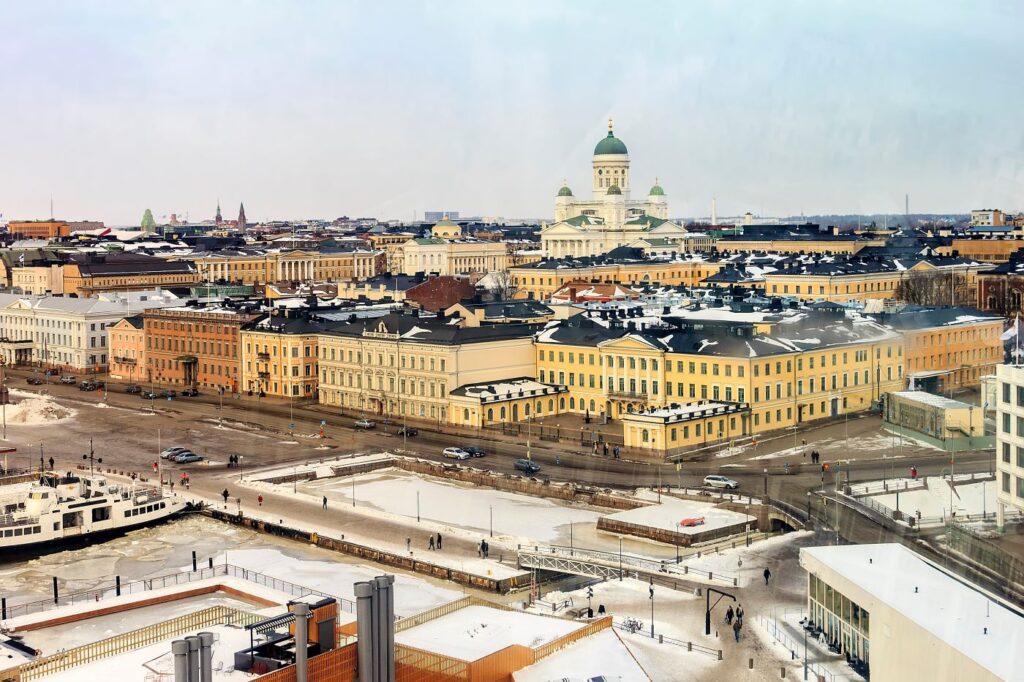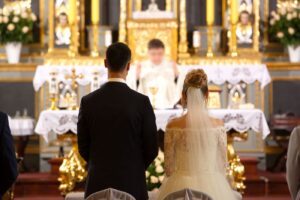I have been a member of the Finnish Parliament for twenty-nine years. During that time, I have witnessed a dramatic change in the value system undergirding our modern society. From the protection of life to the defense of marriage, the changes we are living through are undeniable, with far-reaching implications for us all. And it’s evident that the general atmosphere toward Christianity grows increasingly hostile every day. Only ten years ago, I could not have imagined that I would soon be summoned to my country’s Supreme Court to defend my religious convictions.
“Has somebody occupied Finland?” My six-year-old grandson asked me this in June 2019 when he saw a giant rainbow flag, the biggest we had seen to date, flying over our home city of Riihimäki, Finland. At that same time, the majority church of our country, the Finnish Evangelical Lutheran Church, officially published its support of a Helsinki “pride” event, which disappointed and shocked many (including me).
Before our very eyes, the church was assuming a position contrary to its own confession that God designed marriage for one man and one woman. If the authority of God’s Word is undermined, the question becomes not only about marriage or gender, but also about the path to salvation and eternal life. Every person, including the LGBT community, has the right to hear the whole truth of God’s Word. While I briefly considered leaving my church, I was convinced that it was better to stay aboard and try to wake up those who had fallen asleep, not jump out of a sinking boat.
This was why I wrote a tweet, in which I directed a question to my church leadership. I wanted to exercise my basic right to free speech to publicly ask how they reconciled their activities with biblical teaching. The main content of my post was a photo of verses 24–27 of Romans Chapter 1, where the Apostle Paul teaches that homosexual relations are sinful. A citizen filed a criminal complaint in response to my tweet, and more complaints quickly followed.
Start your day with Public Discourse
Sign up and get our daily essays sent straight to your inbox.These complaints resulted in eighteen months of police investigation and thirteen hours of interrogations. As a former government minister, sitting parliamentarian, and grandmother, I found the situation unreal. Just a few years before, I had been in charge of the police as Minister of Interior, and now I was sitting in the police station being interrogated, with the Bible on the table in front of me.
The questions were shamelessly about the Bible and its interpretation. I was asked, “What is the message of the book of Romans and its first chapter?” and “What do I mean by the words ‘sin’ and ‘shame’?” A joke spread on social media that Päivi Räsänen was once again meeting for a Bible study at the police station. The police asked if I would agree to delete my writings within two weeks. I said no and reasserted my belief in the Bible’s teachings, no matter the consequences. I will not apologize, I explained, for what the Apostle Paul has stated.
After the investigation, I was charged criminally for my post about the Bible’s teaching on marriage. A second charge was filed about a booklet called “Male and Female He Created Them,” which I had written for my church in 2004. Bishop Juhana Pohjola also was prosecuted as responsible for publishing the booklet. A third charge was filed about my biblical views presented in a 2019 radio interview. It was at this time that ADF International came alongside me and we began to defend my case.
The possible sentence for the crime of “ethnic agitation,” of which I have been accused, is up to two years imprisonment or a fine. In Finnish law, it falls within the “war crimes and crimes against humanity” section of the criminal code. The “hate speech” law had passed parliament unanimously without any real debate. I was part of parliament at the time, and I can say that no one saw the danger of this ambiguity back then.
But now I see it quite clearly. An ambiguous law broadly banning “hate speech” that can imprison someone for speaking about their faith on social media is bad enough. But the greatest danger is the threat of society-wide censorship and the crushing effect on freedom of speech and religion. A judgment against me would open the floodgates to a broad ban on the public expression of religious views or other beliefs and the threat of modern book burnings.
In the last five years, I have undergone two trials, first at the District Court and then, following the prosecution’s appeal, at the Court of Appeals, both resulting in unanimous acquittals. The prosecution’s insistence on punishing me for a peaceful expression of my religious beliefs has defied reason, leading to yet another appeal, currently pending before the Supreme Court of Finland.
In the trial at the District Court, the prosecutor at first stated that the trial would not be an inquisition concerning the Bible. But then she surprisingly targeted the core doctrine of Christianity: the teachings of the Gospel. She claimed that my views amounted to a doctrine that she summarized as “love the sinner, hate the sin.” This doctrine she regarded as insulting and defaming because, according to her, you cannot distinguish between the person’s identity and his or her actions. In this view, if you condemn the act, you also condemn the human being and regard him or her as inferior.
This statement goes against both the Christian view of man and common sense. The thought that it is not possible to distinguish between a person’s deeds and the core of their identity is contradictory to our lived reality as well as Gospel truth. The analogy I used in court was that I loved all of my children equally, but at times, when raising them, they required discipline for their wrongful actions.
I also stated in the court that God created all human beings in His own image and we all have equal value, but we are also all sinners. Sin does not diminish our dignity; it is a theological concept that describes the relationship between God and man, and God is the one who defines what sin is. Core to the Christian faith is the belief that God so loved all people that he gave his only son to die on the cross to suffer the punishment that we humans, because of our sin, should have endured.
The Bible’s teaching is, however, clear that marriage is a union between man and woman and that practicing homosexuality is against God’s will. I categorically deny that my thinking or writing might be “hate speech,” defamation, or slander of minorities. The teachings concerning marriage and sexuality in the Bible arise from love, not hate. God desires that all people come to salvation and live in a way that honors Him and is consistent with His design. It is loving, not hateful, to speak that truth. Contrary to this truth, the prosecution stated that everyone can believe what they want to, but free speech should be limited with regard to the outward expression of religion.
I encountered this same kind of restricted understanding of religious freedom when I was the minister responsible for church affairs. In a discussion with the Chinese minister in charge of religious matters, I learned that in China, you can believe whatever you wish, but it is necessary to restrict the freedom to express your faith if it increases tensions in society. While this may appear to increase social cohesion and foster peace, all these restrictions really do is smother individual liberties and create a culture of authoritarianism.
In public, the Prosecutor General stated that if “Räsänen was [to be] convicted, it does not mean that Bibles should be removed from libraries. You can refer to the Bible, Koran or Mein Kampf, because it is not forbidden to discuss historical texts. But what is essential is if you agree with it.” For us Christians, the Bible is the Word of God. We must have the right to not only speak about, but also to agree with the Bible and to confess our faith publicly. Freedom of religion is not something that can be confined to our private lives. It is a right, guaranteed in international law, that we must be able to live out in the public square. If we do not have the freedom to live openly as Christians in the world, it cannot be said that we live in a free society at all.
Ultimately, six judges from two courts did not find anything illegal in my writings. But now, I will continue to fight for freedom of speech and religion before the Finnish Supreme Court. Far beyond just me, this case carries precedent-setting significance and immense weight for the freedom of expression, particularly in matters of faith. At the core of the legal matter is the question whether people will be allowed to share the teachings of the Bible and publicly agree with those teachings.
Criminalizing religious expression through so-called “hate-speech” laws shuts down important public debates and poses a grave threat to our democracies.
While the process has been long, exhausting, and punishing, I remain confident and calm—secure in the knowledge that my actions are rooted in the truth and my defense is based on principles of international human rights. I am ready to continue to defend free speech and freedom of religion before the European Court of Human Rights should it come to that.
The mere fact that there is an ongoing trial, even without a conviction, has a chilling effect across all of society. Accusations, interrogations, and trials cause citizens to fear expressing their convictions. This is a natural consequence of targeting anyone, even more so a public figure. Not to mention that increasing hostility toward Christians has led to the marginalization of classical Biblical teaching in the broader culture. The ideological impact of extreme anti-Christian agendas has grown in both secular culture and the church. This has triggered increasing limitations to freedom of speech for people who reject these agendas. Let’s be clear: the aim is ideological totalitarianism where only one way of thinking about humanity is politically correct. The majority of citizens know that this is not based in reality. But there is little space left to express this view.
Criminalizing religious expression through so-called “hate-speech” laws shuts down important public debates and poses a grave threat to our democracies. As a parliamentarian, I find this especially dangerous. We must be able to disagree and cope with speech that insults us. Rather than combat hate, the criminalization of speech based on subjective criteria creates a culture of fear and censorship.
The more we keep silent about the teachings of the Bible on the difficult issues of our time, the more forceful and complete will be the rejection of biblical truth. I have considered it a privilege and an honor to defend freedom of speech and religion, which are fundamental rights in a democratic state. And throughout this ordeal, I have concretely felt the support of thousands of people, having received messages of encouragement from across the globe.
Ultimately, without the criminal charges imposed on me, I would not have had the exceptional chance to testify to the truth in police stations, courtrooms, and through live broadcasts and press conferences heard around the world. I am grateful to all who have come alongside me in championing the right to live and speak the truth, and I look forward to the day when this fundamental right is upheld for all who seek to express their faith.
Image by MDF and licensed via Adobe Stock.












